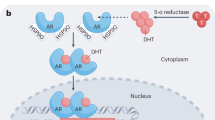Abstract
The growth of pancreatic adenocarcinoma may be under the control of the sex steroid hormone testosterone, besides other unknown stimuli. This premise was based on the discovery of androgen receptors, together with the enzymes aromatase and 5α-reductase, which use testosterone as a substrate, in malignant tissue. The additional support of low circulating serum testosterone and its stimulatory role in an animal model using human tumour xenografts further enhance this suggestion.
Confirmatory evidence has now come from a double-blind, placebo-controlled trial in patients with pancreatic cancer in which flutamide, the pure androgen receptor blocker, doubled survival duration over control patients. Flutamide was administered in a dosage of 250mg 3 times daily. Support for this finding has recently been presented at a meeting of the Pancreatic Society of Great Britain.
It is now important for further confirmatory studies to be carried out and to use flutamide in combination with other current adjuvant therapies in patients with pancreatic cancer.


Similar content being viewed by others
References
Rosewicz S, Wiedenmann B. Pancreatic carcinoma. Lancet 1997; 349: 485–9
Corbishley TP, Iqbal MJ, Wilkinson NIL, et al. Androgen receptor in human normal and malignant pancreatic tissue and cell lines. Cancer 1986; 57: 1992–5
Iqbal MJ, Greenway BA, Wilkinson NIL, et al. Sex steroid enzymes, aromatase and 5 alpha-reductase in the pancreas: a comparison of normal adult, foetal and malignant tissue. Clin Sci 1983; 65: 71–5
Greenway BA, Iqbal MJ, Johnson PJ, et al. Low serum testosterone concentrations in patients with carcinoma of the pancreas. BMJ 1983; 286: 93–5
Greenway BA, Duke D, Pyin B, et al. The control of human pancreatic adenocarcinoma xenografts in nude mice by hormone therapy. Br J Surg 1982; 69: 595–7
Redding TW, Schally AV. Inhibition of growth of pancreatic carcinomas in animal models by hypothalamic hormones. Proc Natl Acad Sci U S A 1984; 81: 248–52
Gonzalez-Barcena D, Ibarra-Olmos MA, Garcia-Carrasco F, et al. Influence of D-Trp-6-LH-RH on the survival time in patients with advanced pancreatic cancer. Biomed Pharmacother 1989; 43: 313–7
Neumann F, Topert M. Pharmacology of antiandrogens. J Steroid Biochem 1986; 25: 885–95
Keating JJ, Johnson PJ, Cochrane AM, et al. Prospective randomized controlled trial of tamoxifen and cyproterone acetate in pancreatic carcinoma. Br J Cancer 1989; 60: 789–92
Swarovsky B, Wolf M, Havemann K, et al. Tamoxifen or cyproterone acetate in combination with buserelin are ineffective in patients with pancreatic adenocarcinoma. Oncology 1993; 50: 226–9
Poyet P, Labrie F, Comparison of the antiandrogenic/androgenic activities of flutamide, cyproterone acetate and magistral acetate. Mol Cell Endocrinol 1985; 42: 283–8
Imai K, Watanabe K, Takahashi O, et al. A study of the androgenic activity of antiandrogen [in Japanese]. Nippon Naibunpi Gakkai Zasshi 1990; 66: 597–606
Greenway BA. Effect of flutamide on survival in patients with pancreatic cancer: results of a prospective, randomized, double-blind, placebo-controlled trial. BMJ (Clin Res Ed) 1998; 316: 1935–8
Sharma JJ, Razvillas B, Stephens CD, et al. Phase II study of flutamide as second line chemotherapy in patients with advanced pancreatic cancer. Invest New Drugs 1997; 15: 361–4
de Takats P, Shaw J. Role of flutamide in the treatment of advanced pancreatic cancer [poster presentation]. 4th Annual Scientific Meeting of the Pancreatic Society of Great Britain and Ireland. Royal College of Physicians of London. Nov 1999, London
Author information
Authors and Affiliations
Rights and permissions
About this article
Cite this article
Greenway, B.A. Androgen Receptor-Blocking Agents. Drugs & Aging 17, 161–163 (2000). https://doi.org/10.2165/00002512-200017030-00001
Published:
Issue Date:
DOI: https://doi.org/10.2165/00002512-200017030-00001




